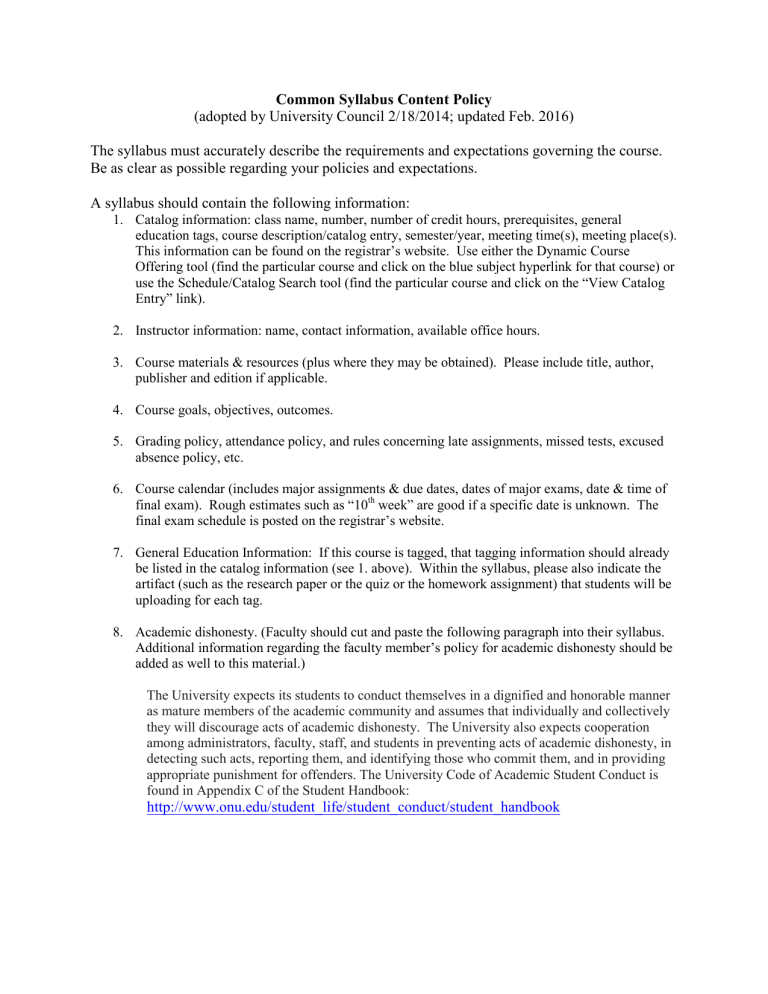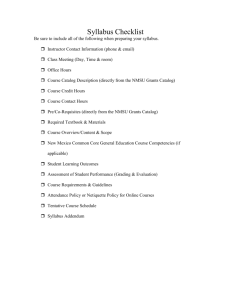Common Syllabus Content Policy

Common Syllabus Content Policy
(adopted by University Council 2/18/2014; updated Feb. 2016)
The syllabus must accurately describe the requirements and expectations governing the course.
Be as clear as possible regarding your policies and expectations.
A syllabus should contain the following information:
1.
Catalog information: class name, number, number of credit hours, prerequisites, general education tags, course description/catalog entry, semester/year, meeting time(s), meeting place(s).
This information can be found on the registrar’s website. Use either the Dynamic Course
Offering tool (find the particular course and click on the blue subject hyperlink for that course) or use the Schedule/Catalog Search tool (find the particular course and click on the “View Catalog
Entry” link).
2.
Instructor information: name, contact information, available office hours.
3.
Course materials & resources (plus where they may be obtained). Please include title, author, publisher and edition if applicable.
4.
Course goals, objectives, outcomes.
5.
Grading policy, attendance policy, and rules concerning late assignments, missed tests, excused absence policy, etc.
6.
Course calendar (includes major assignments & due dates, dates of major exams, date & time of final exam). Rough estimates such as “10 th
week” are good if a specific date is unknown. The final exam schedule is posted on the registrar’s website.
7.
General Education Information: If this course is tagged, that tagging information should already be listed in the catalog information (see 1. above). Within the syllabus, please also indicate the artifact (such as the research paper or the quiz or the homework assignment) that students will be uploading for each tag.
8.
Academic dishonesty. (Faculty should cut and paste the following paragraph into their syllabus.
Additional information regarding the faculty member’s policy for academic dishonesty should be added as well to this material.)
The University expects its students to conduct themselves in a dignified and honorable manner as mature members of the academic community and assumes that individually and collectively they will discourage acts of academic dishonesty. The University also expects cooperation among administrators, faculty, staff, and students in preventing acts of academic dishonesty, in detecting such acts, reporting them, and identifying those who commit them, and in providing appropriate punishment for offenders. The University Code of Academic Student Conduct is found in Appendix C of the Student Handbook: http://www.onu.edu/student_life/student_conduct/student_handbook
9.
Special accommodations. (Faculty should cut and paste the following paragraph into their syllabus.)
Students requiring particular accommodations because of physical and/or learning disabilities should contact their Dean’s office prior to or during the first week of classes. For additional information, see: http://www.onu.edu/student_life/health_and_counseling/disability_services
10.
Other policies unique to course/instructor (laptops, cell phones, leaving during a class, etc.).
An example of a course syllabus incorporating these items is available via this link: http://www.onu.edu/files/sample_syllabus_engl_1221.pdf






